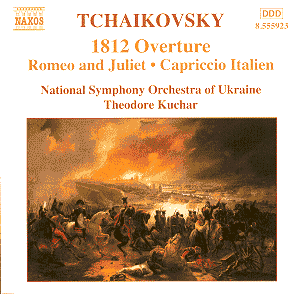Here
we have an attractive selection of Tchaikovskyís ĎGreatest Hitsí
beautifully and powerfully performed and very well recorded, except
that in the early selections the deepest bass is conspicuously
absent, there being nothing on the disk below about 90 Hz. This
reminds one of LP mastering tapes which were filtered this way
to avoid causing groove skips on cheap players. (Maybe theyíll
put the low frequencies back in for the DVD-Audio edition?) It
is most disturbing during the Marche Slav where the distinction
between bass drum and timpani is lost. If you attempt to compensate
by turning your bass control up, youíll be sorry when the cannons
come on in the "1812" and take out your woofers if not
your eardrums! In contrast to many recordings where the credits
for the brass band, bell players and artillerymen occupy half
the program notes, there is here nary a mention; but when the
time comes no recording has more delirious bells, sharper brass
or more aggressively authentic cannon sounds than this one. But
I do also like Karajanís innovation of having the introductory
chorale sung by a male choir rather than played as usual on the
strings as here.
Before
we leave off talking about Marche Slav we might recall
that more than 70 years ago a young firebrand of a conductor made
a justly famous recording of this rousing work on 78s. His name
was Adrian Boult.
The
Capriccio Italien is a problematical work. The allegedly
Italian philosophy it expounds, that is to say, "when times
are bad and all else fails, go out dancing," has rarely been
more pointedly expressed, but the contrast is too stark and it
takes too long to get going, and when we finally get to dancing
we get too drunk too fast. Paul van Kempen did the best job Iíve
heard of balancing all this out.
The
Dance of the Tumblers was completely new to me, and I naturally
had it confused with the piece of the same name by Rimsky-Korsakov.
But a piece of completely new Tchaikovsky is as welcome as it
is hard to come by.
The
Scherchen recording was the very first LP I ever bought and Iíve
heard it so many times itís probably part of my genetic code by
now. No other recording could actually ever replace it in my affection,
although this Romeo and Juliet is within a razorís thickness
of doing so and is certainly the finest stereo version Iíve ever
heard.
Amazingly,
even ignoring 50 years of currency inflation, I paid more for
that monophonic vinyl disk than you might pay for this digital
stereo Naxos CD.
Paul
Shoemaker

![]() National Symphony Orchestra
of Ukraine/Theodore Kuchar
National Symphony Orchestra
of Ukraine/Theodore Kuchar ![]() NAXOS 8.555923 [65.51]
NAXOS 8.555923 [65.51]